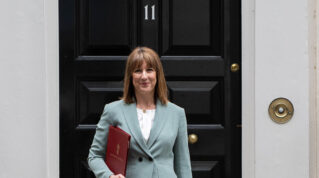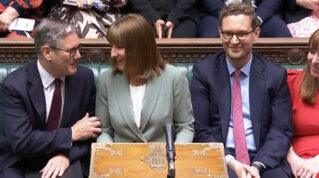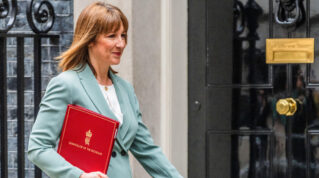Ministers expect to fully implement their school funding reforms “within the next five years”, a new consultation on the plans has revealed.
However, some proposed changes to the way schools receive money from government could come in sooner, with plans to shake up how high needs budgets and growth funding work.
The details were revealed in the latest consultation on plans for a hard “national funding formula” (NFF), which has been repeatedly delayed.
Here’s what you need to know.
1. Money to go direct to schools by 2027
Last year, the DfE admitted in a previous consultation that its funding reforms would not be fully rolled-out for at least three years. Now it has said the reforms could take another five.
The government currently hands out schools cash to councils based on a national formula. But councils then hand the cash to individual schools based on their own local formula.
A “hard” NFF would see the DfE allocations go straight to schools, without any local adjustment.
In its latest consultation, the DfE said it was not setting a “definitive final end date” at which the direct NFF would be implemented, as it would be “important to continue to be guided by
the impact of the initial transition”.
However, it expects to have moved to the direct NFF “by the 2027-28 funding year”.
“We hope that we may be able to move to the direct NFF sooner than this – but not later.”
2. ‘Menu of options’ for transfers to high needs budgets
At the moment, councils can transfer funding between their schools and high needs budgets, though transfers of more than 0.5 per cent or those without the backing of local schools forums have to be approved by the education secretary.
But the government wants a more “consistent” approach, and plans to introduce a “menu of options” for how mainstream budgets could be adjusted following transfers to high needs. This would replace councils’ “complete freedom to propose how the adjustments could be made”.
This could include a percentage reduction in solely the basic entitlement factor (rather than also additional needs factors, meaning schools with more SEND pupils would benefit), or include the cash being transferred from allocations solely for primary or secondary schools.
Although councils would still request a certain amount to transfer in their applications, the education secretary would be allowed to “modify that amount in agreeing to a transfer of funds”.
3. Restrictions on use of growth funding
Councils receive around £250 million a year in growth and falling rolls funding, which is used to support schools that are facing demographic changes in the number of pupils they have.
However, the DfE said councils have “a large amount of discretion” over how the cash is dished out, leading to “considerable variation”. Some councils don’t use all their funding, while others use other budgets to top it up.
For example, the DfE said Camden council in London spent over £2 million in 2022-23 despite only receiving £330,000, while 17 areas used no growth funding at all.
The DfE is proposing two options. The first, which it prefers, would see councils retain some flexibility but with restrictions on how the funding can be used. This could include things like a minimum expectation on when growth funding is awarded.
The second option would be a nationally standardised system, with councils having no say at all.
The government is also consulting on whether to remove the rule that only ‘good’ or ‘outstanding’ schools can receive falling roll funding, and on expanding the use of the funding to support councils to “repurpose and remove” spare classroom space.
4. ‘Popular growth’ funding extended to maintained schools
Academies can also currently receive funding if they are expecting pupil numbers to grow significantly due to their increasing popularity, rather than because of demographic changes.
The DfE is proposing to keep this scheme, but is also consulting on whether the funding should also be available to maintained schools.
5. New formula for ‘split sites’ funding
One factor in the current funding system is for “split sites”, which awards funding for extra costs associated with a school operating across a number of separate sites.
Currently around 450 schools split £28 million in funding every year, but the DfE said there was a “great deal of variation” in the criteria used by councils.
For example, although average funding is £58,000, the amounts handed out range from £2,789 in Derbyshire to £213,690 in Torbay.
The DfE is proposing a national formula for split sites funding, with a basic eligibility criteria that attracts a lump-sum payment, and a distance eligibility criteria for another payment. To meet the latter, schools’ sites would need to be at least 500 metres apart.
Introducing a national system would lead to a reduction in funding for schools that currently receive “generous” funding. But the DfE said it would protect schools from losing money through its minimum funding guarantee.
6. ‘Significant’ reduction in exceptional circumstances cash
Schools also currently receive around £20 million in extra funding for “exceptional circumstances” relating to their premises.
Again, the DfE pointed to variations in funding – which ranged between £2,958 and £600,000, and between 1 per cent and 30.5 per cent of schools’ budgets.
The DfE said it wanted to “significantly reduce the number of schools receiving exceptional circumstances funding so that we target funding only to schools where costs are exceptional and meaningful”.
The exceptional circumstances threshold would be raised from the current 1 per cent of a school’s budget up to 2.5 per cent. Trusts and councils would have to reapply under a new national process to show they meet the new criteria.
The consultation also proposes that some costs currently covered, like lump sums for amalgamating schools, be covered in other factors of the funding formula, while some will be defunded entirely, such as funding for listed buildings.
Funding for schools with farms attached, those that rent additional premises or share the use of a facility would continue to be covered.
7. Minimum funding guarantee to be based on actual budgets
Under the current funding system, councils set a “minimum funding guarantee” for schools to protect them from large losses in funding year-on-year. This is then mirrored in the amounts given to councils through what is called the NFF “floor”.
However, since the current system was introduced in 2017-18, the minimum funding guarantees set by councils and NFF floor set by government have “drifted apart” (this is because one is calculated based on schools’ actual funding and the other based on their NFF allocations).
Under plans for a hard funding formula, the two protections will merge into one minimum funding guarantee, which will be based on schools’ actual funding from the previous year.
8. New funding calculator could aid budget planning
Currently, the DfE usually publishes details of the way NFF funding will be distributed in July. Councils then prepare their own local formula during the autumn and confirm final allocations in the spring.
Under the hard formula, councils will no longer prepare their own local formulae, but the DfE said it would keep the other elements of the timetable the same, publishing the NFF in July each year, giving schools “earlier knowledge of the final formula which will apply to them”.
To help schools understand what the formula will mean for them in practice, the DfE is consulting on two possible options.
The first is to continue to publish data showing what each schools’ funding for next year would look like based on their current pupil numbers.
The second is to provide a “calculator” tool which would allow schools to “plug in their own pupil numbers and pupil characteristics, to see what their funding would be”.
9. So what happens next?
Although the full, hard formula may not come into effect until 2027-28, some changes proposed in the consultation could come sooner.
For example, changes to split sites funding and growth funding could come into effect in 2024-25.
There will also be other consultations, for example, on the options for reforms to how schools with private finance initiative (PFI) contracts receive extra cash. A consultation will also be held on how the NFF works alongside high needs funding.
















Your thoughts